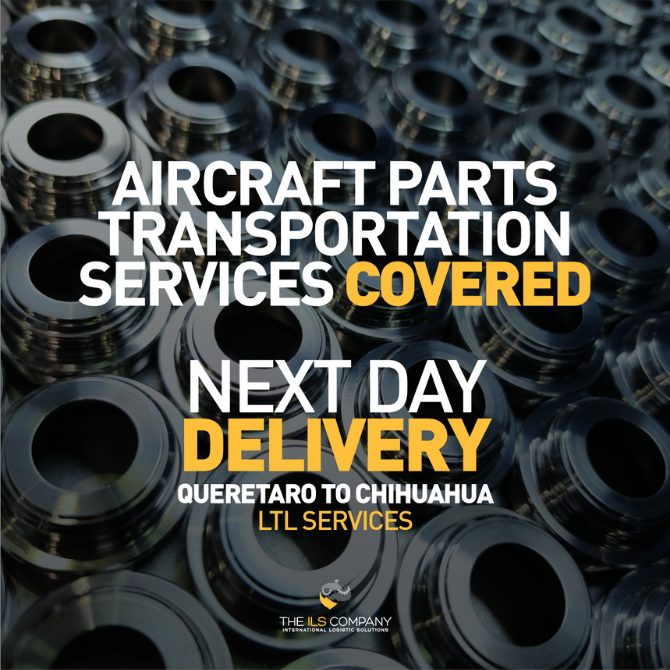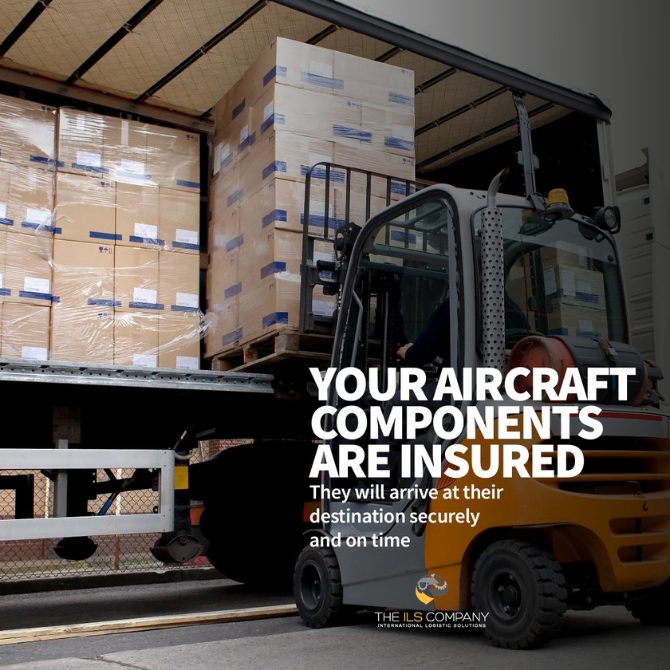
In recent years, Mexico has emerged as a key player in the global aerospace industry. Thanks to its strategic geographic location, highly skilled workforce, and competitive costs, the country has attracted international companies that rely on Mexico for the production of critical components, from engine parts to fuselages. At the ILS company, we help you connect the Querétaro-Chihuahua route to provide seamless aerospace logistics solutions, ensuring that critical components are delivered safely, on time, and with the precision that the industry demands.
Also read: Why do you need a reliable partner to ship your aerospace components?
Table of Contents
Key Hubs in Mexico’s Aerospace Industry
Querétaro has positioned itself as one of Mexico’s main aerospace hubs, hosting companies such as Bombardier, Safran, and General Electric, which manufacture fuselages, turbines, and landing gear. Meanwhile, Chihuahua also plays a vital role, with plants assembling and manufacturing components for companies like Honeywell and Cessna.
The ground connectivity between these states is crucial for keeping the supply chain efficient, as components produced in Querétaro are transported to Chihuahua for further assembly or finishing. The Federal Highway 45, connecting these two states, spans approximately 1,230 km. Depending on traffic and load, transit time for specialized trucks ranges between 15 and 18 hours, allowing for next-day delivery.

The ILS Company ensures the next-day delivery of aerospace components across 1,230 km from Querétaro to Chihuahua, providing reliable logistics solutions for the aerospace industry.
Efficient Logistics for Aerospace Components
Several specialized logistics companies operate along this route, providing dedicated services for the ground transportation of aerospace components. These companies use specialized vehicles and advanced tracking systems to ensure timely and optimal delivery of critical parts.
In addition to Querétaro and Chihuahua, Guaymas, in the state of Sonora, also plays an important role in the aerospace industry. Though lesser-known, this coastal city hosts plants specializing in metal component manufacturing, mainly for engines, using precision turning and milling. Companies such as Paradigm Precision and Horst Engineering rely on Guaymas to produce precision parts crucial to the supply chain.
LTL and Multimodal Solutions
While Guaymas may require longer transport routes due to its coastal location, it benefits from maritime connections that allow for multimodal transportation, integrating ground and sea transport to optimize both time and cost.
Less-than-Truckload (LTL) shipping is a method where multiple shipments from different customers are combined into one truck, rather than filling an entire truck with a single load. This allows businesses to share transportation costs while still receiving timely delivery. In the context of aerospace logistics, LTL is particularly valuable for transporting smaller or more specialized components that may not require full truckload capacity but still need to be delivered urgently and safely. By utilizing LTL services, logistics providers can offer flexible and cost-efficient solutions, ensuring critical aerospace components reach their destination without unnecessary delays or expenses.
Aerospace logistics is highly demanding, requiring reliable collaborators—manufacturers, suppliers, and logistics companies. The latter play a critical role in ensuring components arrive on time and in perfect condition, supporting both routine and urgent shipments with customized logistical solutions. A competent logistics provider must offer multimodal capabilities and tailor-made solutions, such as LTL and ground-sea integrations, to meet the needs of this highly specialized industry.

At the ILS Company, we offer LTL services for shipping aerospace components from Querétaro to Chihuahua, guaranteeing 24-hour delivery to meet critical logistics needs.
Economic Impact in Querétaro, Chihuahua, and Guaymas
The aerospace industry has not only transformed the industrial landscape of Querétaro, Chihuahua, and Guaymas but has also driven significant economic development in these regions. These states have seen sustained growth in foreign direct investment and the creation of highly skilled jobs. Querétaro, for example, has become a top destination for aerospace investment, attracting multinational companies and generating thousands of jobs.
Chihuahua and Guaymas have also consolidated their strengths in the global supply chain, with plants supplying both the national and international markets, including exports to the U.S. and Europe. The aerospace industry’s impact in these regions has led to infrastructure development, talent training, and an improvement in local living standards.

Chihuahua plays a significant role in Mexico’s aerospace industry, contributing 15% to national aerospace manufacturing and generating 70% of employment in the capital.
Technological Innovations in Aerospace Logistics
Given the critical nature of aerospace components, transportation has greatly benefited from technological innovations. Logistics companies operating on the Querétaro-Chihuahua route and to Guaymas are beginning to implement AI-driven solutions and big data analytics to optimize transport routes, reduce transit times, and minimize risks.
Additionally, real-time monitoring systems like GPS tracking and IoT sensors allow companies to have complete visibility of transport conditions, ensuring that components arrive in perfect condition and on time. These technologies are especially important when transporting delicate or high-value parts.

Your aircraft components are insured with ILS Company, ensuring they arrive securely and on time at their destination.
Future Challenges in Ground Transportation for the Aerospace Industry
Despite advances in infrastructure and technology, the aerospace industry still faces significant challenges in ground transportation. The growing demand for efficiency and speed requires logistics companies to continuously improve their processes and equipment. One of the main challenges is the capacity of existing roads and infrastructure to handle the volume of goods traffic on key routes like Querétaro to Chihuahua.
Another challenge is the increasing pressure to reduce the environmental impact of transportation. While sustainable solutions, such as more efficient vehicles and optimized routes, are already being implemented, there is still much to be done to meet international sustainability standards in the industry.


